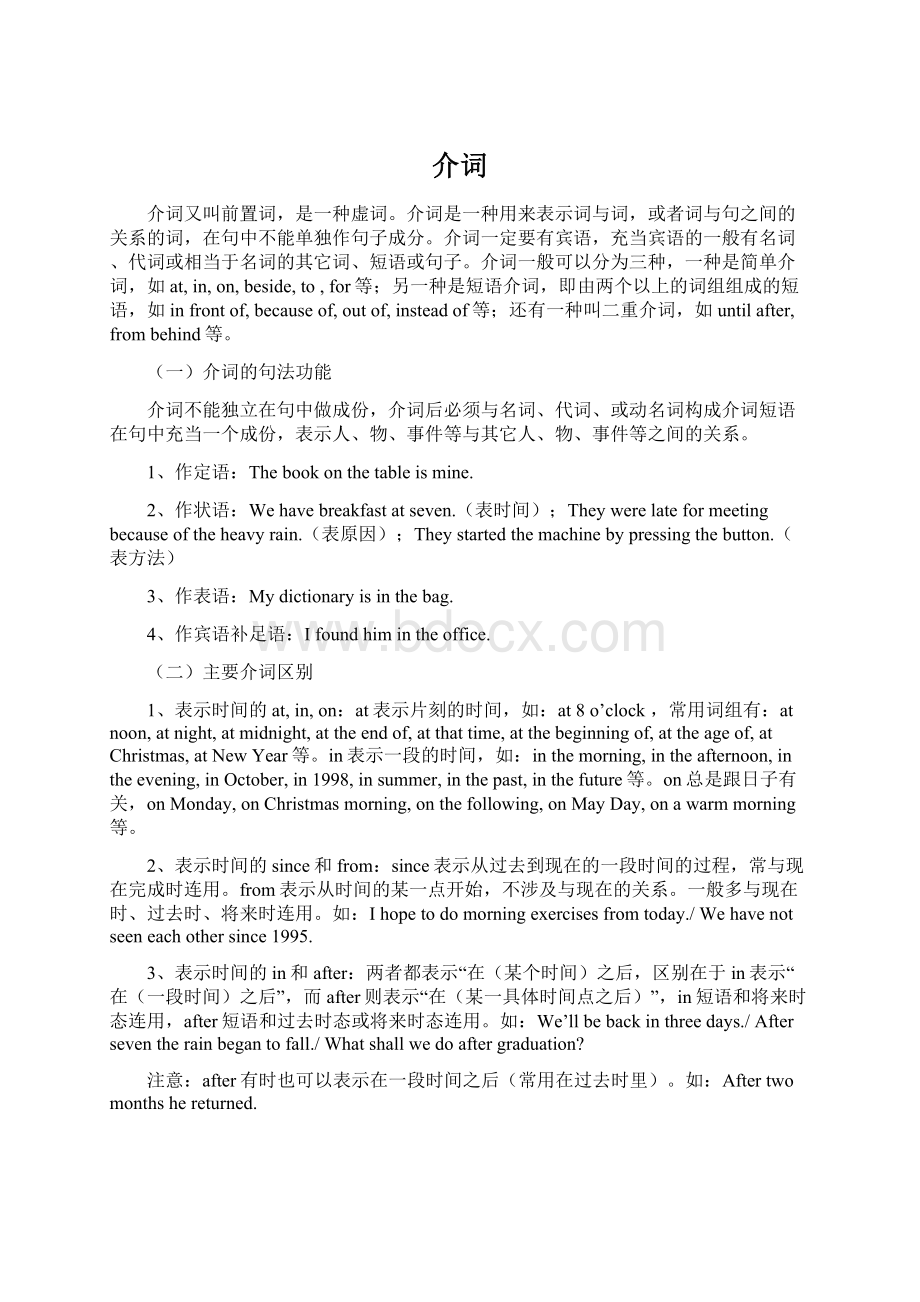介词.docx
《介词.docx》由会员分享,可在线阅读,更多相关《介词.docx(13页珍藏版)》请在冰豆网上搜索。

介词
介词又叫前置词,是一种虚词。
介词是一种用来表示词与词,或者词与句之间的关系的词,在句中不能单独作句子成分。
介词一定要有宾语,充当宾语的一般有名词、代词或相当于名词的其它词、短语或句子。
介词一般可以分为三种,一种是简单介词,如at,in,on,beside,to,for等;另一种是短语介词,即由两个以上的词组组成的短语,如infrontof,becauseof,outof,insteadof等;还有一种叫二重介词,如untilafter,frombehind等。
(一)介词的句法功能
介词不能独立在句中做成份,介词后必须与名词、代词、或动名词构成介词短语在句中充当一个成份,表示人、物、事件等与其它人、物、事件等之间的关系。
1、作定语:
Thebookonthetableismine.
2、作状语:
Wehavebreakfastatseven.(表时间);Theywerelateformeetingbecauseoftheheavyrain.(表原因);Theystartedthemachinebypressingthebutton.(表方法)
3、作表语:
Mydictionaryisinthebag.
4、作宾语补足语:
Ifoundhimintheoffice.
(二)主要介词区别
1、表示时间的at,in,on:
at表示片刻的时间,如:
at8o’clock,常用词组有:
atnoon,atnight,atmidnight,attheendof,atthattime,atthebeginningof,attheageof,atChristmas,atNewYear等。
in表示一段的时间,如:
inthemorning,intheafternoon,intheevening,inOctober,in1998,insummer,inthepast,inthefuture等。
on总是跟日子有关,onMonday,onChristmasmorning,onthefollowing,onMayDay,onawarmmorning等。
2、表示时间的since和from:
since表示从过去到现在的一段时间的过程,常与现在完成时连用。
from表示从时间的某一点开始,不涉及与现在的关系。
一般多与现在时、过去时、将来时连用。
如:
Ihopetodomorningexercisesfromtoday./Wehavenotseeneachothersince1995.
3、表示时间的in和after:
两者都表示“在(某个时间)之后,区别在于in表示“在(一段时间)之后”,而after则表示“在(某一具体时间点之后)”,in短语和将来时态连用,after短语和过去时态或将来时态连用。
如:
We’llbebackinthreedays./Afterseventherainbegantofall./Whatshallwedoaftergraduation?
注意:
after有时也可以表示在一段时间之后(常用在过去时里)。
如:
Aftertwomonthshereturned.
4、表示地理位置的in,on,to:
in表示在某范围内,on指与什么毗邻,to指在某环境范围之外。
如:
ChangchunisinthenortheastofChina./MongoliaisonthenorthofChina./JapanistotheeastofChina.
5、表示“在……上”的on和in:
on只表示在某物的表面上,而用in表示占去某物一部分。
如:
Thereisabookonthepieceofpaper./Thereisaninterestingarticleinthenewspaper./Hedugaholeinthewall.
6、表示“穿过……”的through和across:
through表示从内部通过,与in有关;across则表示从一端至另一端在表面上的通过,与on有关。
如:
Waterflowsthroughthepipe./Theoldmanwalkedacrossthestreet.
7、inthecorner,onthecorner,atthecorner:
inthecorner表示在角落里,in指角的内面;onthecorner表示“在角上”,on指的不是内面,也不是外面,而含内外兼有之意;atthecorner指“在拐角处”,at指的是拐角外附近的外面。
如:
Thelampstandsinthecorneroftheroom./Imetwithhimatthestreetcorner./Hesatonthecornerofthetable.
8、intheend,attheendof,bytheendof:
intheend作“最后”、“终于”解,可单独使用,后不接介词of;attheendof表示“在……末梢”,“到……尽头”,既可指时间,也可以指地上或物体。
不可单独使用;bytheendof作“在……结束时”,“到……末为止”解,只能指时间。
不可单独使用。
如:
Intheendtheyreachedaplaceofsafety./Attheendoftheroadstandsabeautifulgarden./TheydecidedtohaveanEnglisheveningattheendofthisweek./bytheendoflastmonthhehadfinishedthenovel.
9、表示“关于”的about和on:
两者都有“关于”的意思,不过前者为一般用词,而后者为较正式的“论述”。
如:
Hecametotellmeaboutsomethingimportant./Hewroteabookonscience.
10、between,among:
一般说来,between表示两者之间,among用于三者或三者以上的中间。
如:
Youaretositbetweenyourfatherandme./Heisalwayshappyamonghisclassmates.
注意:
但有时说的虽然是三个以上的人或东西,如果强调的是两两相互间接关系,适用于between。
如:
Agreementsweremadebetweenthedifferentcountries.在谈到一些事物或一组事物,而把它们视为分居两边时用between。
如:
Thelittlevalleyliesbetweenhighmountains.。
在谈事物间的差别时,总是用between。
如:
Theydon’tknowthedifferencebetweenwheat,oatsandbarley.
11、besides,except,but,exceptfor:
besides指“除了……还有,再加上”。
如:
Allwentoutbesidesme.;except指“除了,减去什么”,不能放在句首。
如:
Allwentoutexceptme.;but与except意思近似,表示“除了……外”经常用在no,all,nobody,anywhere,everything等和其他疑问词后面。
如:
Ineversawhimreadinganythingbutthenewspaper.;exceptfor表示“如无……就,只是”表明理由细节。
如:
Hisdiaryisgoodexceptforafewspellingmistakes.。
12、表示“用”的in和with:
表示工具的“用”,用with,而表示材料、方式、方法、度量、单位、语言、声音等的“用”,用in。
如:
Heiswritingaletterwithapen./Hewrotetheletterinpencil./Wemeasureditinpounds./Readthetextinaloudvoice./TellmethestoryinEnglish.
13、inchargeof和inthechargeof:
两者都表示“由谁负责、照顾、管理”。
区别在于:
inchargeof后接被照管的人或物,而inthechargeof后面则跟照管的人。
如:
Whoisinchargeoftheproject?
/Theprojectisinthechargeofanengineer.。
14、as,like:
as作“作为”、“以……地位或身份”解。
如:
Letmespeaktoyouasafather.(事实是父亲);like作“象……一样”解。
如:
Letmespeaktoyoulikeafather.(事实上不是父亲)。
15、infrontof和inthefrontof:
infrontof=before,是“在……前面”的意思(不在某物内);inthefrontof则是“在……前部”的意思(在某物内)。
如:
Thereisadeskinfrontoftheblackboard./Theboysatinthefrontofthecar.。
16、in,into:
into表示动向,不表示目的地或位置。
如:
Wewalkedintothepark.;in通常表示位置。
如:
Wewalkedinthepark;in和drop,fall,put,throw,break等终止性动词连用时,也可以表示动向。
如:
Ihaveputthecoinin(into)mypocket.我把硬币放进衣袋。
介词
I.介词分类:
1
简单介词
about,across,after,against,among,around,at,below,beyond,during,in,on
2
合成介词
inside,into,onto,outof,outside,throughout,upon,within,without
3
短语介词
accordingto,becauseof,insteadof,upto,dueto,owingto,thanksto
4
双重介词
fromamong,frombehind,fromunder,tillafter,inbetween
5
分词转化成的介词
considering(就而论),including
6
形容词转化成的介词
like,unlike,near,next,opposite
II.常用介词区别:
1
表示时间的in,on,at
at表示片刻的时间,in表示一段的时间,on总是与日子有关
2
表示时间的since,from
since指从过去到现在的一段时间,和完成时连用,from指从时间的某一点开始
3
表示时间的in,after
in指在一段时间之后,after表示某一具体时间点之后或用在过去时的一段时间中
4
表示地理位置的in,on,to
in表示在某范围内,on指与什么毗邻,to指在某环境范围之外
5
表示“在…上”的on,in
on只表示在某物的表面上,in表示占去某物一部分
6
表示“穿过”的through,across
through表示从内部通过,与in有关,across表示在表面上通过,与on有关
7
表示“关于”的about,on
about指涉及到,on指专门论述
8
between与among的区别
between表示在两者之间,among用于三者或三者以上的中间
9
besides与except的区别
besides指“除了…还有再加上”,except指“除了,减去什么”,不放在句首
10
表示“用”的in,with
with表示具体的工具,in表示材料,方式,方法,度量,单位,语言,声音
11
as与like的区别
as意为“作为,以…地位或身份”,like为“象…一样”,指情形相似
12
in与into区别
in通常表示位置(静态),into表示动向,不表示目的地或位置
介词训练
介词的考点主要有:
同一介词可表达多种意义,同一场合意义不同则介词不同;常见介词的用法;介词的固定搭配;复合介词及双重介词的使用。
使用点有:
1.Hekepthishead_____waterwhenhebegantolearnswimming,butheraisedhisheadnowandthen
A.overB.belowC.aboveD.up
2.Anothergrandbridgewillbebuilt_____thePearlRiverinourcity.
A.alongB.upC.onD.across
3.I'llleaveBeijingforGuangzhou____aweek,whilemybrotherwillleaveGuangzhouforBeijing____ourNationalDay.
A.in,inB.after,inC.after,afterD.in,after
4.Thehugepicturelooksmorebeautiful_____thebluesky.
A.againstB.toC.overD.under
5.Theclimateheredoesn'tagree_____her.
A.toB.onC.withD.at
6.2.StandardtimeinBeijingiseighthours____GreenwichMeanTime(GMT格林威治标准时间).
A.afterB.frontC.aheadofD.forward
7.---Canyoutellmewhat’syouraiminlife,LiPing?
---Iamaiming____afamousphysicist.
A.atB.forC.inD.to
8."Pass____thebus,everyone."theconductorshoutedpolitely.
A.onB.intoC.toD.along
9.Iwasangry_____missingthegongfufilmwithChengLongashero.
A.atB.withC.forD.on
10.Wewereanxious_____newsofyoursafearrival.
A.toB.ofC.forD.at
11.Tomwasarguing_____thepaymentofthebill_____John.
A.about;onB.over;withC.on;onD.with;with
12.Theywereastonished_____thenewsofhisescapefromprison.
A.forB.inC.atD.to
13.Hewasabsorbed____abookanddidn’thearyourrepeatedcall.
A.toB.inC.withD.at
14.---Areyoufamiliarwiththebankoverthere?
---Onlyalittle,Ihaveanaccount____it.
A.inB.withC.toD.of
15.Thedoctorbent_____theboyandcheckedhiswound.
A.upB.onC.aboveD.over
16.Maryansweredallthequestions_____thelastone,whichshehadneverheardofbefore.A.besidesB.exceptC.apartfromD.exceptfor
17.Hunanlies_____suchprovincesasHubei,Jiangxi,Guangdong,GuizhouandChongqin.A.amongB.aboveC.besideD.between
18.Thedyingmanis_____thehelpofthedoctor.
A.outsideB.withoutC.outofD.beyond
19.Idon’tknowwhyheblamedtheaccident_____me.
A.atB.toC.forD.on
20.Thehorseisblind_____thelefteye.
A.toB.inC.forD.on
21.Heisverystrictwithothers,butheisalwaysblind_____hisownshortcomings.
A.forB.toC.withD.in
22.Wewillneverforgetthishistoricallessonwritten_____blood.
A.byB.withC.ofD.in
23.Itissaidthatabridgeisbeingbuilt_____theriver.
A.underB.toC.overD.at
24.---Howdidyougotoworkyesterday?
---Iwenttowork_____myfriend’sprivatecar.
A.byB.inC.onD.at
25.Thetrainleavesat6:
00p.m.,soIhavetobeatthestation____5:
40p.m.attheleast.
A.untilB.afterC.byD.around
26.Icalled_____youlastnight,butyouwereout.
A.withB.onC.atD.in
27.Youshouldwritethefirstletterofthesentence_____capitalone.
A.onB.withC.inD.at
28.Heistoocareful_____hismoney;heneverbuysadrinkforus.
A.toB.atC.forD.with
29.Canyousay_____certainwhenhewillcomehere?
A.atB.forC.withD.in
30.Morethan20yearsagohewasbadlywoundedintheanti-Vietnamwar.Sincethenhecanonlywalk_____anarm-chair.
A.inB.onC.byD.over
31.Einsteindidn’tcareformoney.Onceheusedacheck_____$1000asabookmarkandthenhelostit.
A.forB.ofC.aboutD.to
32.WhentheChinesedelegationarrivedatViennaairport,theywerereceived_____cheers.A.inB.forC.onD.with
33.Thelittleboyisveryclever_____everysubject.
A.atB.inC.aboutD.on
34.Herclothesareverybright_____colour.A.ofB.inC.onD.with
35.Don’tsit_____thecornerofthedesk.That’simpoliteforastudent.
A.onB.inC.toD.at
36.Itissaidthatthestep-motherisverycruel_____thechildren.
A.withB.atC.aboutD.to
37.Theboyiscurious_____everything.Iamsureheisveryclever.
A.toB.aboutC.withD.in
38.Sheiscrazy_____thefilmstar,whileherbrotheriscrazy_____surfing.
A.to;forB.on;toC.for;atD.for;on
39.Onceeveryoneis_____hislife,hewillinstinctively(本能)findeverypossibleway_____.
A.indangerof;outofdangerB.inthedangerof;outofdanger
C.indangerof;outofthedangerD.inthedangerof;outofthedanger
40.Let’sputourheadstogetheranddeci